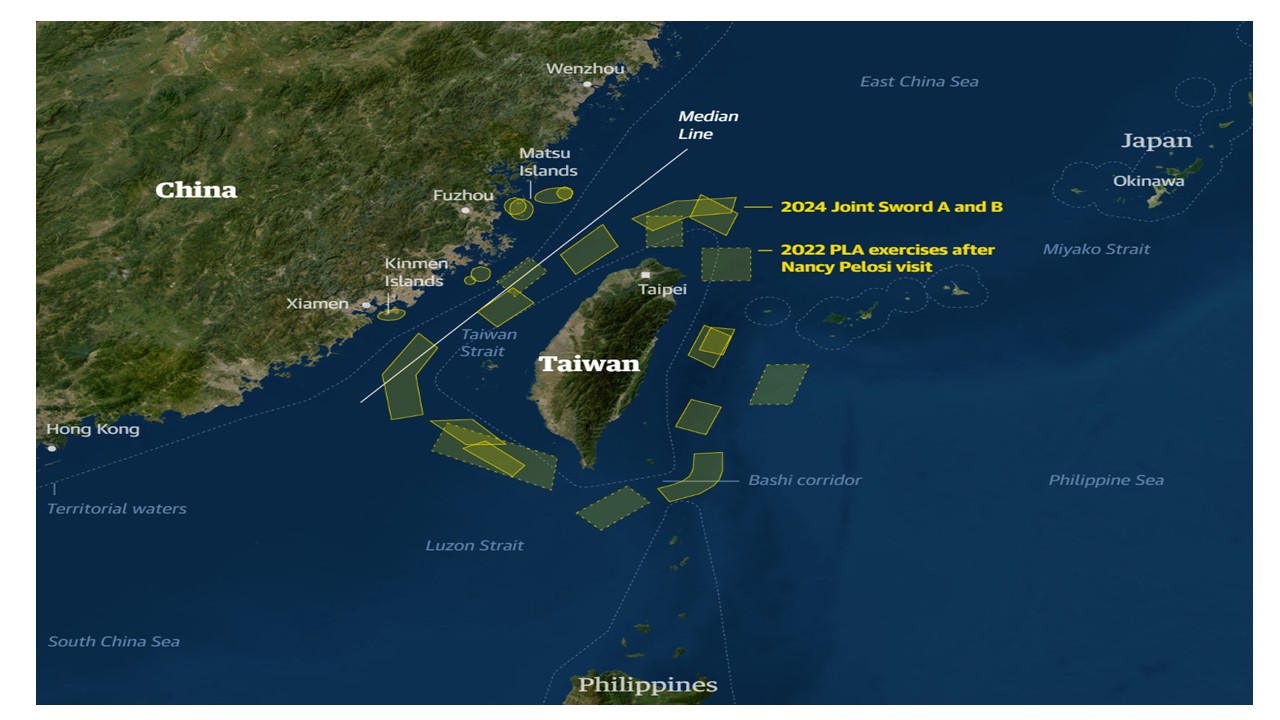China: How Much U.S. Trade and Taiwan Pressure?
· Trump eventually wants a trade deal with China and this could occur by the end of 2025, but the U.S. will ask for penalties if targets for U.S. imports to China are not met and this will lead to difficult negotiations. Reciprocal and product specific tariffs on China are also likely in the spring. Meanwhile, Trump has so far maintained the strategic ambiguity policy towards Taiwan. While this remains in place, a China invasion of Taiwan would be too high risk for President Xi and we still feel the odds are low in 2025-26.
The U.S. is imposing more trade pressure on China with 10% extra tariffs, but is President Trump aiming for a trade deal or strategic isolation of China?
Figure 1: China PLA Drills Around Taiwan
Source: Guardian
While the geopolitical focus has been on Ukraine and Gaza in the early days of the Trump administration, views are still forming on the stance on China. A number of considerations are worth noting.
· Trump tariffs then trade deal. China targeted counter tariffs in response to the 10% Fentanyl tariff reflects the desire for all issues to be negotiated at the same time, with China officials preferring a revised phase 1 trade deal. The U.S. does not appear willing to now hold talks until the reciprocal tariffs against China are drafted for April and Trump on Thursday threatened an extra across the board 10% against China on March 4 over Fentynal imports. Trump will want to stay involved in this, given his interest in China. China could do a targeted counter to any reciprocal tariffs actually implemented, but also push to get down to negotiations in late spring. We would still feel that a trade deal is feasible by late 2025, but the U.S. will push hard for a phase 2 deal that includes penalties if targets for U.S. imports to China are not met. This will be a red line for China initially.
· Multipolar world rather than China isolated. Some have questioned whether Trump wants a Ukraine peace deal to separate Russia from China by weakening Russia export dependence on China. However, President Xi and Putin know that their strategic alliance is for decades and mutually beneficial. We also feel that Trump does not want to be sucked into a war with Russia by Ukraine or Europe and also wants to open up the Artic to an oil and economic boom – hence the Greenland interest. Additionally, if a Democratic president were elected in the U.S. in 2028 then the U.S. attitude to Russia could shift. Meanwhile, under Trump a shift towards a multi-polar world is occurring. Europe is less important to the U.S. in economic and military terms and Trump bias against multilateral organisations will likely produce a multipolar world for the next few years.
· Trump and Xi versus U.S. China Hawks. Trump is on friendly terms with Xi, which is good for business as China have been concerned about a lack of respect from the U.S. in the past. However, the U.S. administration and congress want to strategically restrict China. A ban on China investment in tech companies this week shows the mood in Washington. The question is whether Trump will allow a strategic ramp up in tensions with China, if he is trying to do a trade deal. If trade negotiations are going badly then Trump like 2018 will likely be aggressive to China (though not Xi personally), but if a trade deal is near then Trump could delay others strategic push against China.
· Taiwan. China is planning large military exercises around Taiwan, both as it has been frustrated by some of the U.S. state department change to its website over Taiwan independence and to keep up pressure on the Taiwan president. President Trump refused to be drawn in on Wednesday over whether the U.S. would provide military support for Taiwan in the scenario of an invasion, which we see as being consistent with the previous U.S. policy of strategic ambiguity – U.S. secretary of state Rubio clarified this Wednesday night. Whether this U.S. policy stance changes in the future is possible and uncertain and Trump has no problem overruling his cabinet. Trump is also clearly against any more wars involving the U.S. However, a lot of people around him want to keep the strategic ambiguity policy. What is clear is that Xi will not invade Taiwan unless he is assured of victory, both given Russia problems in the Ukraine invasion and the huge difficulties in a major seaborne invasion across a 140 miles sea. If the U.S. keeps the strategic ambiguity policy, then the risks of failure from an invasion would be too high for Xi.
